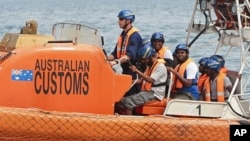This week, Australian Foreign Minister Kevin Rudd is in Indonesia where he is expected to discuss new ways to combat people smuggling. The plight of asylum-seekers being smuggled to Australia gained new prominence last month after 150 people drowned when their boat sank off Java. An Australian court has struck down a deal to send unauthorized arrivals to Malaysia, so the government is trying to find an alternative plan.
Hadi Hosseini, an ethnic Hazara from Afghanistan, was brought to Australia last year by people smugglers. Like thousands of other asylum seekers, Hadi, 18, travelled through Malaysia and on to Indonesia, where he boarded a rickety fishing boat for an uncertain voyage to Australia.
“I think it cost about $12-13,000. It was all of my money that my family had at that time. It was my first experience on a seat in the boat. I haven’t been in the ocean or sea because we have no sea in Afghanistan. It was terrible," Hadi said. "It was very hard. After a terrible situation in Malaysia and Indonesia, and then when we got the boat my journey took about one week. There were about 30 people. We had not much water and stuff to eat. And lots of tension. It was horrible.”
More than 200 asylum seekers were onboard a boat that sank earlier last month off Indonesia. Fewer than 50 have been found alive. In Canberra, there is political consensus that unauthorized arrivals who come by sea should be sent to other countries to have their refugee claims processed. Proponents argue that with no guarantee of resettlement in Australia, asylum seekers will be less likely to risk the dangerous journey.
A demonstrator holds a placard outside the venue of the signing ceremony between Malaysia and Australia to swap refugees, in Kuala Lumpur July 25, 2011. (Photo - Reuters)
But lawmakers differ on where the refugees should be sent. The minority Labor government wants to deport asylum seekers to Malaysia instead of an isolated detention center in the South Pacific.
“Neither the Labor government nor the conservative opposition can agree on what would be a suitable form of offshore processing," said newspaper columnist Gerard Henderson. "The Labor government wants Malaysia, the conservative opposition wants Nauru, and there is deadlock on that.”
Henderson was an adviser to John Howard, Australia’s former prime minister, whose conservative government sent asylum seekers to camps in Papua New Guinea and the tiny island of Nauru. Mr. Howard said his approach stopped the boats coming from Indonesia. His critics insisted that the practice was inhumane.
The strategy was abandoned after Labor won the 2007 election. Henderson says the government's mixed messages since then have led to an increase in asylum seekers. Authorities are now trying to deter more arrivals through advertising campaigns.
Australia spends a fortune trying to combat the traffickers, but the criminal gangs responsible for ferrying the migrants into Australian waters are hard to catch. Theirs is a business worth millions of dollars.
Professor Mary Crock, a specialist in immigration and refugee law at the University of Sydney, says authorities should think of new ways to stop the boats.
“You have to try to look at mechanisms to provide legal alternatives to the boats by setting up visa programs; working holidaymaker visas we used to have with Iran," she said. "Many of the people coming out [are] actually highly skilled. Why don’t we give them a legal avenue to come in so that they can come in and contribute directly to society instead of coming in as shipwreck survivors? Why don’t we do that?”
Sayed Hussain Hussaini traveled to Australia from Iran.
“I wish I was in Iran living with my wife and my baby and that I never came to Australia," he said.
Now living in Sydney, Hussaini lost his wife and young son when their boat sank a year ago off Christmas Island, an Australian territory in the Indian Ocean.
“I took some rope and was wondering 'Where is my wife? Where is my baby?' I cannot find them," he lamented. "I did not come to Australia to lose my family. I am always thinking about them when I am asleep, when I wake up, when I shower, when I am eating. Every time I remember them.”
While the political impasse continues, Australia is processing all asylum claims on home soil. Government ministers warn, however, that this will simply encourage thousands more asylum seekers to risk their lives on unsafe boats.
Australia Debates Plans to Deter More Boat Refugees
- By Phil Mercer




